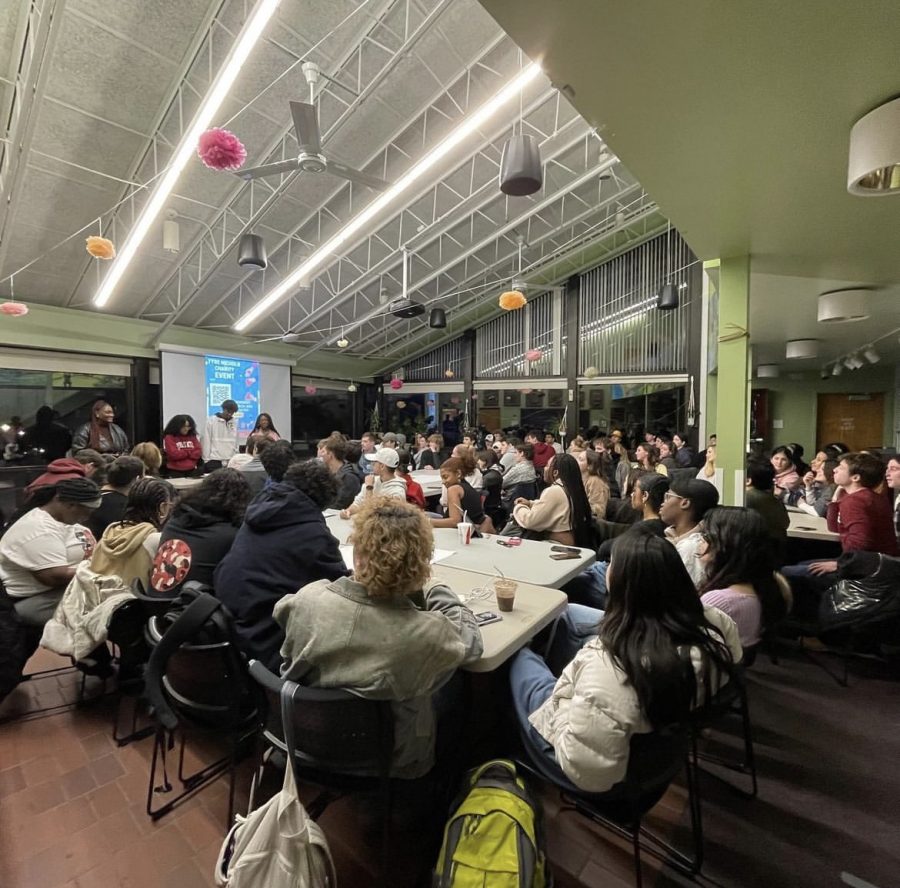BSU Hosts Police Brutality Dialogue In Honor of Tyre Nichols
In honor of Tyre Nichols — a Black man who died after being beaten by Memphis police officers on Jan. 7 — Colgate University’s Black Student Union (BSU) organized an open dialogue on experience and identity in relation to police brutality and racism on March 2. The event was co-hosted by BSU and the ALANA Cultural Center, and it was part of BSU’s larger charity weekend that aimed to raise $10,000 for Nichols’ family.
The event was well attended by over 100 students interested in discussing the issues of police brutality and was sponsored in collaboration with Brothers of Colgate, Colgate African Students Association, Caribbean Students Association, Latin American Students Association (LASO), Phi Delta Theta, Phi Kappa Tau, Theta Chi, Beta Theta Pi, Gamma Phi Beta and Kappa Kappa Gamma.
Sophomore Analuisa Furiati explained she was eager to attend the open dialogue.
“I’m excited to attend events that create a more accepting and loving community on this campus,” Furiati said.
When asked about the benefits of open dialogues, especially after traumatic events, Ester Rosbrook, director of the ALANA Cultural Center, explained the importance of the conversation.
“Open dialogues, especially those that explore traumatic events, can strengthen Colgate’s diverse community in a few ways,” she said. “Open dialogue allows people in the room to learn from each other’s perspectives and stories in the room. This can result in knowledge and self-awareness building that helps our community progress.”
The dialogue began with a land acknowledgment, introductions from student leaders, as well as ground rules for participating, such as being careful to speak on only your own experience rather than an entire group — regardless of shared identity. The leaders also emphasized challenging oneself to contribute and making space for those who have not yet spoken. The event concluded with a video made in remembrance of Nichols’ life consisting of interviews with his family members and friends.
Some of the questions prompting discussion asked, “How have we seen Black victims of police brutality in the media?”, “What does justice look like to you?” and “When did you become racially conscious?”. Each table had a large poster on which students could write important points from their discussion.
BSU Co-President and sophomore Rhoman Elvis called the room back together to share what each group had discussed, and important comments and calls to action on police brutality began. Students shared views on how they believe news outlets choose images that depict Black victims as violent, malicious or irresponsible they believe that while white perpetrators are shown among family and friends, or doing acts of service. Students also discussed how justice requires a dismantling of capitalism and accountability.
Conversations also included topics such as participation in Greek Letter Organizations and the larger BIPOC experience at Colgate. Several students expressed their personal views regarding participation in Greek Life and other social interest organizations, highlighting personal experiences of feeling (even if unintentionally) isolated at parties, mixers and other events because of their race.
Sophomore Clementina Aboagye shared her experience.
“As a white student, try making social environments more comfortable for your Black friends by including them and listening to what their needs are,” Aboagye said.
Sophomore Anthony Garcia explained his views on the issue, including how white people and people of color should work together to address racial issues.
“We need to know this isn’t a [people of color] against white people issue — it’s a POC with white people issue. Although we are differently affected by these issues we are all fighting against the same struggle,” Garcia said.
Rosbrook emphasized the importance of these conversations in terms of creating community and connection.
“Open dialogue allows people to be in the same room, in person, observing, processing and regulating our emotions. Having an in-person observation of feelings, senses, and desires to understand what is going on and creating meaningful actions can help our diverse community to a flourishing continuum. Therefore, this can result in the ability of our community to exercise our emotional intelligence and, most importantly, build empathy towards those harmed populations,” Rosbrook said.
The dialogue came to an end after an hour of fruitful discussion, and student leaders closed out the night by stressing the multitude of mental health and peer resources available on campus.







